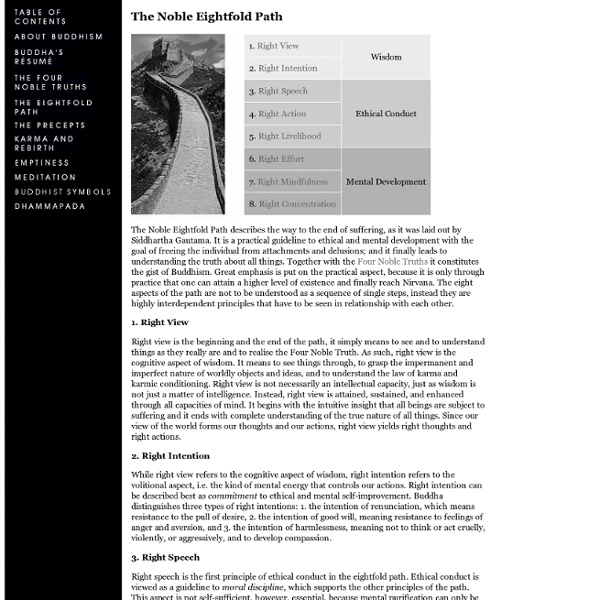



http://www.thebigview.com/buddhism/eightfoldpath.html
Healing the Body with Mindfulness of Breathing « Metta Refuge This excerpt from a talk by Zen Master Thich Nhat Hanh explains how to use mindfulness of breathing to bring loving-kindness to our dear bodies. The physical effect of this can be truly remarkable. As Thây says, “You should really love your body. You should really take care of your body. Mindful breathing, with rest, can do miracles Never Talk to the Police By Dave Hitt on Mar 31, 2010 in Featured, Police State What’s the best response when a cop asks you something? Silence, or a short, polite non-answer. Shut up. Most popular High or Child Posts, Pg. 1 Submitted on 30/10/11 60 Guesses Ate a whole large bag of spicy kettle chips
Philip Goldberg: Beatles in India: The Retreat That Reverberates Across the Universe Forty five years ago, the Beatles were settling into the ashram of their new guru, Maharishi Mahesh Yogi, in Rishikesh, India. The news coverage was nonstop and global, as it had been six months earlier when the lads first met Maharishi and became public advocates for his Transcendental Meditation technique. It would have been easy at the time to dismiss the media frenzy as just another pop culture craze. All About Anarchism This classic statement of anarchism was written by a diverse group of anarchists in Cardiff around 1980 and it is an interesting historical record of the optimism of mainstream anarchist thought at that time. There is probably more rubbish talked about anarchism than any other political idea. Actually, it has nothing to do with a belief in chaos, death and destruction. Anarchists do not normally carry bombs, nor do they ascribe any virtue to beating up old ladies.
Amazing Love Story - Bob Marley Quotes- Definition Of Love . Bob Marley Quotes- Definition Of Love "You may not be her first, her last, or her only. She loved before she may love again. Our Christian Earth: The astounding reach of the world’s largest religion, in charts and maps Filipino Christians crowd into Manila's streets for the annual procession of the Feast of the Black Nazarene. (David Greedy -- Getty Images) Christmas is an official government holiday in the United States, one that coincides with a smaller and informal but well-known tradition: debating whether or not there is a "war on Christmas." In this thinking, American Christians are obligated to "stand up and fight against this secular progressivism that wants to diminish the Christmas holiday," as prominent Fox News host Bill O'Reilly recently argued. "We have to start to fight back against these people." This is often portrayed as a global fight; O'Reilly, in one of his books, suggested that the "war on Christmas" is part of an effort to "mold [the U.S.] in the image of Western Europe."
Faith of Our ForeFathers December 2006 The Founders are once again in vogue. More than 35 books have been published about them just since January according to Gordon Wood, the foremost authority on that era. One of the sub topics of these books concerns the depth of the religious convictions of these men, particularly the Big Six: Washington, Franklin, Jefferson, Madison, Hamilton, and Adams. Authors coming from a conservative religious perspective believe that the Founders were highly religious and that the religious convictions of these men have been underestimated or deliberately ignored.